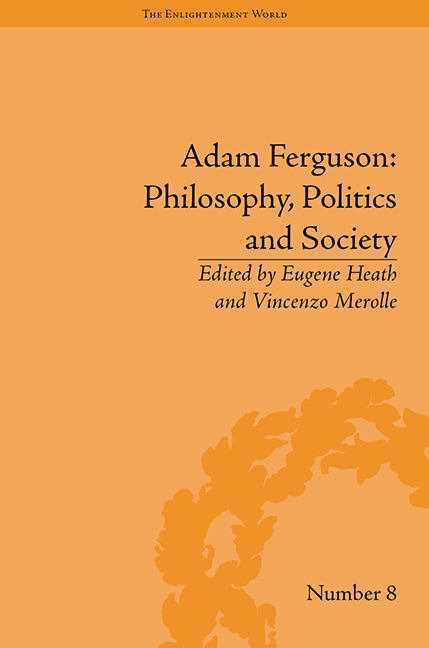Book contents
- Frontmatter
- CONTENTS
- Contributors
- Acknowledgements
- Introduction
- I Life and Works
- II Philosophy
- 3 Why Did David Hume Dislike Adam Ferguson's An Essay on the History of Civil Society?
- 4 Hume as Critic of Ferguson's Essay
- 5 The Two Adams: Ferguson and Smith on Sympathy and Sentiment
- III Politics
- IV Society
- Notes
- Works Cited
- Index
5 - The Two Adams: Ferguson and Smith on Sympathy and Sentiment
from II - Philosophy
- Frontmatter
- CONTENTS
- Contributors
- Acknowledgements
- Introduction
- I Life and Works
- II Philosophy
- 3 Why Did David Hume Dislike Adam Ferguson's An Essay on the History of Civil Society?
- 4 Hume as Critic of Ferguson's Essay
- 5 The Two Adams: Ferguson and Smith on Sympathy and Sentiment
- III Politics
- IV Society
- Notes
- Works Cited
- Index
Summary
The first two editions of An Essay on the History of Civil Society appeared between the publication of Adam Smith's The Theory of Moral Sentiments in 1757 and his An Inquiry into the Nature and Causes of the Wealth of Nations in 1776. Although much has been made of their differences, evidence suggests that Ferguson and Smith's work have more in common than is traditionally recognized. In this essay, I highlight their theoretical overlap while emphasizing those elements whose apparent differences belie some agreement. My emphasis will be on Ferguson's Essay but I will address other works whenever helpful. In particular, I will show that Ferguson's critique of Smith's sympathy is more ambiguous than it might seem, and that a comparison of Ferguson's manuscripts to his published work betrays either contradictory assertions or a change of mind regarding the moral theory proposed in the Moral Sentiments.
Given their publication dates, it should not be surprising that the Essay shares concepts with the Moral Sentiments, or that the Wealth of Nations contains material that either advances or responds to Ferguson's work. Word choice, the use of particular examples, and the framework of the three investigations suggest participation in a common discourse. This too should be expected. Smith and Ferguson were the same age, travelled in the same circles and were influenced by some of the same texts. They knew each other and interacted both socially and professionally. The Scottish literati as a whole were a tight-knit group, taking an interest in one another's lives, work and fortunes.
Smith had many of Ferguson's books in his library, and we can assume that social expectations would have predisposed him to be sympathetic to Ferguson's work, the Essay in particular. We know that Ferguson read all of Smith's publications as well. Yet their letters betray an unease in their friendship, vacillating in degrees of formality, with salutations that shift from ‘Dear Sir’, to ‘My Dear Friend’, back to ‘My Dear Sir’ again, and then to, ‘My Dear Smith’, through a lifetime of correspondences. Additionally, unlike their letters to others, there is nothing of philosophical substance contained within them.
- Type
- Chapter
- Information
- Adam FergusonPhilosophy, Politics and Society, pp. 89 - 106Publisher: Pickering & ChattoFirst published in: 2014



